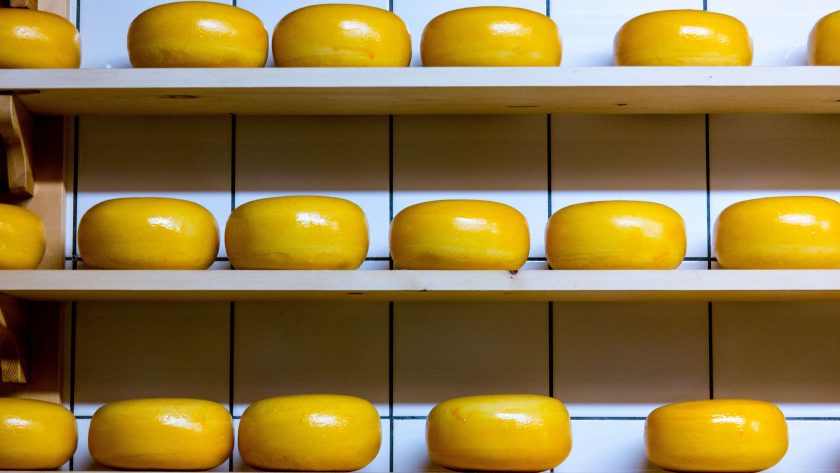If you are a cheese lover like me, chances are you have stumbled upon the enigmatic Muenster cheese at some point in your culinary adventures. With its creamy texture and tangy flavor, Muenster cheese certainly has a reputation for being a crowd-pleaser.
- What Makes Muenster Cheese So Special?
- Is Muenster Cheese a Guilty Pleasure?
- The Verdict – Moderation and Muenster Cheese, the Perfect Pair
- Exploring Alternative Options
- Muenster Cheese, an Alluring and Balanced Choice
- What are the main ingredients in Muenster cheese?
- How many calories are there in Muenster cheese?
- Does Muenster cheese offer any nutritional benefits?
- Can Muenster cheese be part of a healthy diet?
- Are there any lower-fat alternatives to Muenster cheese?
- Can Muenster cheese be enjoyed by those with lactose intolerance?
- How long does Muenster cheese last in the refrigerator?
- Can Muenster cheese be frozen?
- What are some delicious ways to enjoy Muenster cheese?
- Is Muenster cheese suitable for vegetarian diets?
But is it truly a healthy indulgence or just another culinary myth? Today, we embark on an exciting quest to unlock the secrets behind this delightful cheese and explore whether it truly lives up to its reputation. So, grab your crackers and let’s dig in!
What Makes Muenster Cheese So Special?
To understand the Muenster cheese phenomenon, we need to dive into its rich history and unique characteristics. Originating from the Alsace region of France, Muenster cheese was brought to America by European immigrants in the late 19th century. Its name actually comes from the small town of Münster, Germany, although it differs from traditional German Münster cheese in taste and texture.
Imagine a cheese that combines the smoothness of a young Swiss cheese with the tang of a mild blue cheese. That’s Muenster cheese for you! Its creamy texture, pale yellow color, and vibrant orange rind make it instantly recognizable on any cheese platter.
Muenster cheese is traditionally made from cow’s milk, and its flavor profile ranges from mild and buttery to slightly nutty and earthy. Its melt-in-your-mouth texture makes it perfect for grilled cheese sandwiches, while its subtle tang enhances the flavor of a simple cheese and charcuterie board.
Is Muenster Cheese a Guilty Pleasure?
Now, let’s delve into the ever-important question: Is Muenster cheese a healthy indulgence or a dietary nemesis? As a self-proclaimed cheese enthusiast and self-taught culinary explorer, I must admit I had my reservations about the nutritional content of this beloved cheese. However, my skepticism began to crumble when I discovered the surprising truth behind the creaminess.
While Muenster cheese does contain a moderate amount of fat, it also provides essential nutrients that can be beneficial to our bodies. Just like any other cheese, it is a good source of calcium, which promotes strong bones and teeth.
Additionally, Muenster cheese boasts a decent amount of protein, necessary for building and repairing tissues. To put it into perspective, enjoying a moderate portion of Muenster cheese is akin to savoring a small slice of heaven while nourishing your body.
The Verdict – Moderation and Muenster Cheese, the Perfect Pair
In the quest for a healthy lifestyle, balance is always key. And guess what? When it comes to Muenster cheese, moderation is your golden ticket! While it may not be the go-to cheese for those adhering to a strict diet, it can undoubtedly be a part of a well-rounded, tasty, and wholesome diet.
In my personal journey with Muenster cheese, I have found that pairing it with fresh, crisp veggies is a delightful way to enjoy its creamy goodness guilt-free. A crisp slice of cucumber or a juicy cherry tomato marry beautifully with the tangy and buttery flavors of Muenster cheese, creating a delectable combination of textures and tastes that are sure to please.
Exploring Alternative Options
For those seeking a lower-fat alternative without compromising on flavor, fear not! The world of cheese is a vast and varied one, offering a plethora of options to satisfy even the most discerning palates. If you are looking to expand your cheese horizons, consider trying goat cheese, which is lower in fat and calories compared to Muenster cheese.
With its mild, slightly acidic taste and creamy texture, goat cheese can be an excellent substitute in recipes calling for Muenster cheese. Its distinct character also pairs remarkably well with sweet and savory ingredients alike. Whether crumbled over a vibrant summer salad or tucked away in a fluffy omelet, goat cheese is a versatile option that will surely spark joy in your culinary escapades.
Muenster Cheese, an Alluring and Balanced Choice
As we wrap up our exploration into the world of Muenster cheese, it’s clear that this creamy delight is not merely a culinary myth but a delicious and versatile option for indulgence. Although it should be enjoyed in moderation due to its fat content, the nutritional benefits it offers, such as calcium and protein, make Muenster cheese a worthy addition to any cheese lover’s repertoire. Check also Substitutes For Feta Cheese (My Trick List).
What are the main ingredients in Muenster cheese?
Muenster cheese is typically made from cow’s milk. The cheese is carefully crafted using traditional cheesemaking techniques, combining quality milk with specific cultures to develop its unique flavor and creamy texture. Some variations of Muenster cheese might include additional ingredients like salt or natural colorings.
How many calories are there in Muenster cheese?
A 1-ounce serving of Muenster cheese contains around 103-120 calories, depending on the specific brand or variety. Remember, though, that calorie content can vary, so it’s essential to check the nutrition facts on the packaging to get an accurate count!
Does Muenster cheese offer any nutritional benefits?
Indeed! Muenster cheese provides essential nutrients your body needs. It is a good source of calcium, which promotes strong bones and teeth. It also contains protein, vital for tissue repair and building. Moderation is key here, as Muenster cheese has moderate fat content, so it’s always best to enjoy it as part of a balanced diet.
Can Muenster cheese be part of a healthy diet?
Absolutely! Muenster cheese can be a part of a healthy diet when consumed in moderation. Its nutritional profile, including calcium and protein, makes it a valuable addition to your meals. Pair it with fresh veggies for a wholesome and satisfying snack or add it to your sandwiches for a burst of flavor.
Are there any lower-fat alternatives to Muenster cheese?
If you’re watching your fat intake but still want to indulge in cheesy goodness, there are some options available! Goat cheese is a fantastic alternative that offers a lower fat and calorie content compared to Muenster cheese. It has a distinctive tangy flavor and creamy texture that can be a wonderful substitute in recipes or enjoyed on its own.
Can Muenster cheese be enjoyed by those with lactose intolerance?
Muenster cheese is generally well-tolerated by individuals with lactose intolerance. The aging process of the cheese helps break down the lactose, making it easier to digest. However, everyone’s tolerance levels can vary, so it’s always best to listen to your body and consult with a healthcare professional if you have any concerns.
How long does Muenster cheese last in the refrigerator?
When stored properly, Muenster cheese can last for several weeks in the refrigerator. It’s best to keep it in its original packaging or wrap it tightly in wax paper or plastic wrap to maintain its flavor and prevent it from drying out. Remember to check the expiration date and follow any storage instructions provided by the manufacturer.
Can Muenster cheese be frozen?
Freezing Muenster cheese is an option, but it can affect the texture and flavor. When thawed, the cheese may become crumbly or slightly grainy. It’s still safe to eat, but it might not be as enjoyable. If you do choose to freeze it, wrap it tightly in freezer-safe packaging and consume it within a few months for the best quality.
What are some delicious ways to enjoy Muenster cheese?
The possibilities are endless! Muenster cheese is incredibly versatile and can be enjoyed in various ways. It’s fantastic melted on a grilled cheese sandwich, tossed in a salad, or sliced on a charcuterie board. Get creative and experiment with different combinations – you’ll be amazed at how Muenster cheese can elevate your favorite dishes! Did you know that Brown Sugar is The Secret Ingredient for Irresistible Coffee? Look at it 😉
Is Muenster cheese suitable for vegetarian diets?
Muenster cheese is suitable for lacto-vegetarian diets as it is made from cow’s milk. However, it’s important to check the specific brand or variety you are purchasing, as some cheeses might contain rennet, an enzyme sourced from animals. Look for vegetarian-friendly versions or those labeled as suitable for vegetarians to ensure it aligns with your dietary preferences.
So, the next time you stumble across a plate of Muenster cheese on your gourmet journey, don’t hesitate to give it a try.
Embrace its velvety texture, savor its tangy notes, and remember that with moderation, even the most indulgent treats can find a place in your heart and on your plate. Happy cheesing, fellow foodies!
Photo by Katrin Leinfellner on Unsplash



